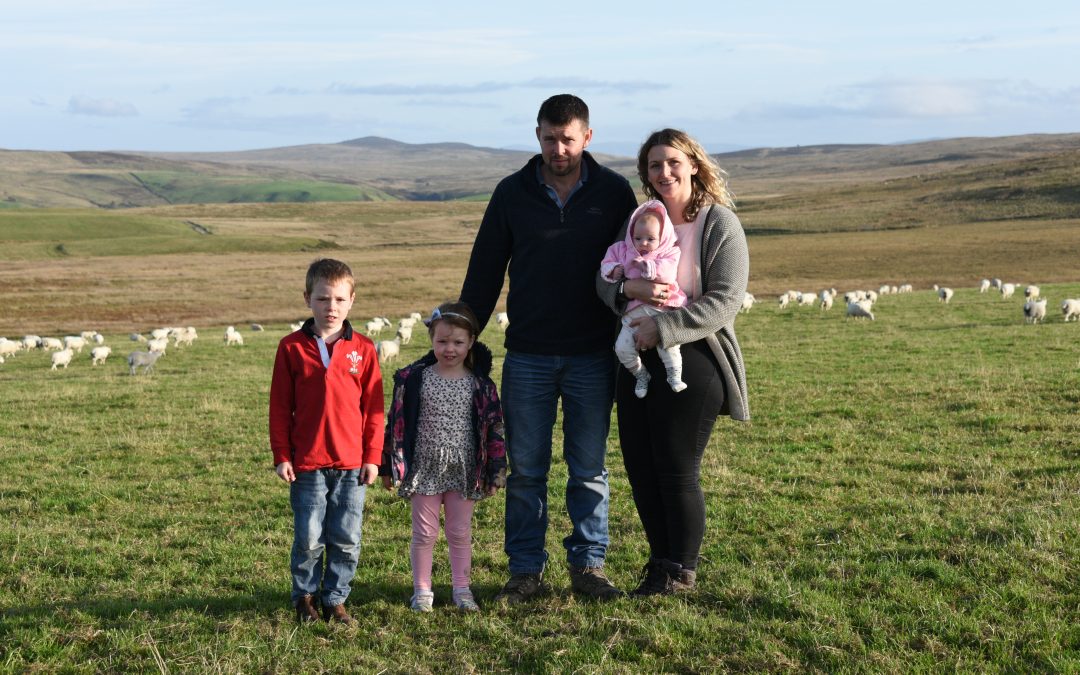850 acres
850 Improved Welsh ewes
150 Stabiliser suckler cows
Native Welsh hill sheep together with a complementary suckler herd are the lifeblood for Llion and Siân Jones’ farming business. Within two years of joining HCC’s Hill Ram Scheme and the Prohill marketing group, the couple’s Improved Welsh flock is on track to improve its performance and sustainability, and ultimately add value by supplying rams with improved genetic potential for the hill farming sector.
“We’re focused on utilising as much grass as possible on our exposed unit located between 1,000’ and 1,500’. We are enhancing our sole forage-based system by introducing forage crops, we are adding clovers and plantain to the re-seeds, and have started to rotational graze. We want to minimise both fixed and variable costs – fertiliser and labour as well as vet and med,” Llion explains.
“We also now have some of the most modern tools literally to hand to help improve genetic potential and are performance recording the entire flock. Whilst it’s early days, recording and then using the data to cull hard has enabled us to reduce flock lameness in year two from 10% to 2% and increase lambs reared by 6%. Our five-year goal is to achieve improved flock health, performance and genetics.
The couple inherited a mix of sheep when they took over the family farm three years ago. “We decided to select one pure breed and close the flock. We agreed the Improved Welsh was the way to go; she is a hardier ewe, a tidy size maturing at 60kg to 65kg, able to lamb outdoors and rear two lambs that will go on to finish to meet 40kg market requirements off forage.
“This year we lambed 500 Improved Welsh ewes, they scanned 160%, we grazed them for six weeks on 10 acres of swedes and then introduced them to grass three weeks prior to lambing outdoors in early April; 80% lambed within the first cycle and the majority without any intervention.”
The couple are already multipliers for the Stabiliser Cattle Company and had seen the benefits of performance recording. “We were aware of the fact that increasing genetic potential is both cumulative and permanent and subsequently took the opportunity to join the Prohill scheme,” Siân explains. “Once you have the data, you’ve resources to help make decisions.
“We’ve established a 300-ewe nucleus flock which we record six times during the year including at pre-tupping, scanning pre lambing and together with their lambs at 12-week weaning and backfat scan. It sounds a lot of work, however after the initial set up it’s relatively straight forward using a wand and phone app, while data is transferred straight to the desktop.
“We’re using this data to enable us to determine the highest performing breeding stock, we are currently running eight rams of which five are Elite within the breed’s top 10% EBVs selected for ease of lambing, motherability, milk and growth rates. We use DNA shepherding, an ear snip at eight weeks to determine the lamb’s parentage and subsequently from the highest performing stock.
“In addition to using the data to determine the highest performing ewes, we also select for specific traits. We cull hard for lameness including footrot, prolapse, poor udders, lambing ease and lambs reared together with body condition score. We regard poor BCS amongst the biggest causes of lamb losses consequently ewes must score a minimum 3.0 to help themselves carryover winter on pure forage diets.”
The stringent process currently results in 30% of the main flock culled and replaced by 300 selected ewe lambs.
Llion adds; “The Improved Welsh wether and cull ewe lambs are demonstrating their ability to finish to 15kg market spec by November, together with lambs from the bottom 20% performing ewes put to a terminal sire. With all lambs gone by November, the unit is freed up and we are able to save forage for flushing ewes.”
HCC’s Hill Ram Scheme has attracted 60 member flocks which performance record; they are all focused on increasing genetic merit, producing lambs that meet market requirements from extensive, forage-based systems and breeding rams with known, improved performance. The Prohill marketing group was set up in 2020 to promote performance recorded rams from these flocks and now includes 33 members selling at their annual sale in Aberystwyth, from home or through society sales.
So far, the scheme has attracted almost 16,000 ewes, members are using some of the latest technology including DNA shepherding, to select and breed from the best performing animals, producing stock with improved genetic potential to supply the UK hill farm sector.
ProHill members are using a new Hill Index, developed by Signet and HCC which combines both maternal and carcass traits, to identify the top performing animals. Lamb performance is monitored from birth to eight weeks, giving an accurate picture of the ewe’s maternal ability, whilst from eight to 20 weeks, growth and carcass traits are measured, highlighting the lambs’ own performance. The gathered data is analysed by Signet to develop various Welsh EBVs to help producers to make more informed decisions in their selection procedures.
If you are considering using performance recorded rams in your system, take a look at our 2022 Catalogue
